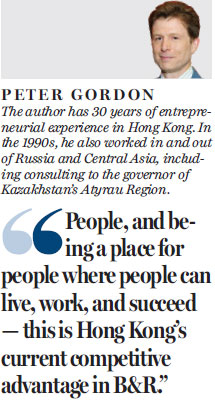Hong Kong can make a play for Belt and Road's human capital
Updated: 2016-06-30 08:06
By Peter Gordon(HK Edition)
|
|||||||
That China and Russia are expected to sign a multibillion-dollar high-speed rail deal soon is a reminder that Belt and Road (B&R) has a northern - far northern - track. This track, indeed, existed for decades before B&R or any new 21st-century Silk Road had lodged in anyone's mind.
The history of Hong Kong-Russian relations therefore offers a case study in B&R opportunities, not least because Russia is larger and economically more developed than the bulk of B&R countries, especially those in the original core region of Central Asia.
It is fair to say that Hong Kong-Russian cooperation has not blossomed to the extent that both sides hoped when relations began some two and a half decades ago. Russian financial institutions are conspicuous by their absence here; Russian companies have not, as some hoped, listed by their dozens on the Hong Kong Stock Exchange.
However, the 1990s had Hong Kong punching well above its weight in what was then still "the former USSR". Hong Kong financial firms, emerging markets experts, were among the pioneers in investing in the fledgling Russian stock markets and took major positions in certain Russian companies soon after privatization. Hong Kong companies were major investors and players in several Russian commodities industries from steel to fish, and in Russian infrastructure from telecoms to ports. Hong Kong companies were even active in technology, with investments in post-Soviet semiconductor plants.
This seems like a somewhat random collection of successes, but one can discern several patterns. The first is that they occupy areas where Hong Kong was relatively strong - a significant regional player if not necessarily global leader. Hong Kong financial firms had had more experience than most in the then emerging markets of Asia and had a competitive edge when Russia first opened up. China had a voracious appetite for raw materials, but less ability 20 to 25 years ago than later to finance purchases. And, although it is often forgotten now, Hong Kong in the 1980s and 1990s had a tech industry, including semiconductor labs, design and, across the border, manufacturing.

Another feature of this early period was geography: Not only did China figure highly in Hong Kong-Russian trade and investment but Hong Kong firms also had a disproportionate presence in the Russian Far East, especially in Primorsky Krai, the southernmost coastal province. Hong Kong firms were involved in the fishing fleets, ports and shipping, both directly and via shareholdings.
This geographic bias is hardly surprising - it is what one would expect - but it illuminates that business success usually correlates to an identifiable competitive advantage, and these were Hong Kong's relative strengths at that time.
Each of these industries has since changed considerably: The Russian financial markets became proceduralized and regulated; China developed the ability to finance its own commodity supply chains; and what was competitive in technology in the 1990s wasn't a decade or so later. Russian multinationals did not list on the Hong Kong bourse at that time not just because of Hong Kong listing regulations - which were a factor - but also because Russian companies were not at that point prepared to adopt the necessary standards of transparency. Russian financial firms were just beginning to inch into Hong Kong when the 1998 Russian financial crisis put paid to the plans then on the table.
The Russia that emerged from the crisis was quite a different place - more centralized and concentrated. Hong Kong had less relative advantage, in general and vis-a-vis the Chinese mainland in particular, when the new millennium dawned.
The successes we see today - and there most certainly are some - are not really those that were on anyone's radar in the 1990s. Hong Kong has, for one thing, become home to young professionals from Russia and - a distinction that was drawn less explicitly 20 years ago - from other countries of the former USSR. It is not uncommon to hear Russian spoken on the streets, in shops and in restaurants here by people who are clearly residents rather than tourists. And Russians (and Ukrainians) are disproportionately represented in the Hong Kong arts scene, from musicians to artists, instructors and gallery owners.
In the 21st century, opportunities in a knowledge economy are most likely to come from people. Hong Kong can make a play for B&R's human capital, to attract and keep the region's best and brightest. Although Hong Kong's claim to be Asia's world city is sometimes disparaged, it nevertheless has little competition. Foreigners compete here on an even playing field; there are few places in the world where starting an actual business is easier. English, still the global language, is used as a matter of course; educational institutions rank (as far as students are concerned, pace the rankings which use other criteria) as the region's best. When the sky is blue (more often than naysayers admit), Hong Kong is a beautiful place.
People, and being a place for people where people can live, work, and succeed - this is Hong Kong's current competitive advantage in B&R.
(HK Edition 06/30/2016 page1)